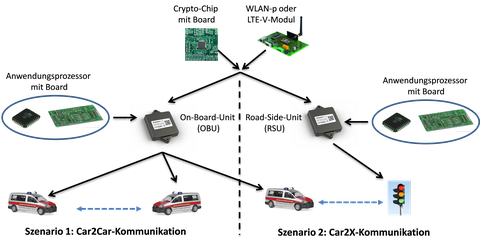Fast Sign
Project description
Present (802.11p) and future (LTE-V, 5G) infrastructure for Car2Car and Car2X-Communication will offer the possibility to collect and share a lot of data in a highly complex and dynamic environment. The use of this infrastructure for safety critical telematic applications requires a trustworthy communication by signing messages to prevent fraudulent use and manipulation of information. These technics will be needed in the future for Car2Car and Car2X-communication in cooperative driving manoeuvres, for example when driving manoeuvres are planned based on the received information of other communication partners.
The receiver of a signed message is able to authenticate the sender so that it can be said for certain who has sent the message.
The project “Fast Sign” therefore develops a crypto-core for elliptic curves to do fast signing and authentication of messages with low latency by integrating the core in the communication paths of time- and safety-critical telematic applications.
The overall objective of the project is the development of a demonstrator for a Car2Car- and Car2X-communication scenario by using present and future communication technologies (WLANp, LTE-V) and the developed unified crypto-chip. The further assignment is to optimise the demonstrator concerning the performance (End to End Latency, data throughput, number of integrated network nodes).
Tasks of the chair
The assignment of the chair Transport Systems Information Technology within the project is to simulate and validate communication scenarios related to Car2X in a laboratory environment by using software defined radio and to investigate the interfaces and protocol stack of WLANp and LTE-V.
Furthermore the aim is to optimise the radio channel with respect to the communication range and signal stability by integrating a real-time antenna beam switching for Car2X-Modules.
Following the testing and optimising of the developed sub-modules (Crypto-core, WLANp/ LTE‑V module, application processor, antenna array) is the integration in an overall module (RSU/OBU) and implementation in an operable demonstrator, followed by Car2X long-term studies with emergency vehicles in cooperation with the Verkehrsunfallforschung an der TU Dresden GmbH (VUFO).
Sponsors:
Bundesministerium für Bildung und Forschung
Project executing organization:
Projektträger Jülich, Forschungszentrum Jülich GmbH
Project coordinator:
IHP GmbH – Innovations for High Performance Microelectronics/ Leibniz-Institut für innovative Mikroelektronik, Frankfurt (Oder)
Project partners:
IHP GmbH – Innovations for High Performance Microelectronics/ Leibniz-Institut für innovative Mikroelektronik, Frankfurt (Oder)
Green Way Systems GmbH, Frankfurt (Oder)
Dresden Elektronik Ingenieurtechnik GmbH
Project duration:
01.07.2017-30.06.2020
Contact person:
Hagen Ußler

